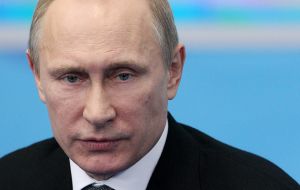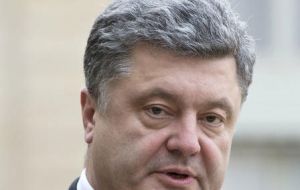MercoPress. South Atlantic News Agency
Ukraine falling to economic warfare and its own missteps
 Putin has called for payment of 38 billion from Ukraine, the result of unpaid gas sales
Putin has called for payment of 38 billion from Ukraine, the result of unpaid gas sales  If Petro Poroshenko wins the presidency, Ukraine will need a prime minister that is accepted in the east
If Petro Poroshenko wins the presidency, Ukraine will need a prime minister that is accepted in the east As protests in Ukraine's eastern region turned violent on Sunday leading to the death of a Ukrainian security officer in a shootout with pro-Russian militia, Kiev threatens military action while Moscow flexes its geo-economic warfare muscles.
Pro-Russian militia groups have seized government buildings and police headquarters in Ukraine's eastern city of Donetsk and Slovyanks--where the shoot-out took place--and despite a Monday morning ultimatum by the Ukrainian government, these groups have shown no sign of giving in.
There has been no movement by the Ukrainian military to make good on its ultimatum; indeed, the messages have been unclear and contradictory.
Acting president Oleksander Turchinov has dangled the idea of a referendum that would seek to address the demands of the region's Russian-speaking population for more autonomy. In the same breath, Turchinov on Sunday promised a “large-scale anti-terrorist operation” to prevent another incident such as Crimea, which was annexed by Russia last month.
On Sunday, Moscow requested an emergency meeting of the United Nations Security Council (UNSC), while NATO came out with estimations that Russia had amassed up to 40,000 troops in more than 100 locations along its border with Ukraine.
This is the atmosphere that leads us up to 25 May presidential elections in Ukraine, which will be shaped by metamorphosing relations with Russia-and by energy.
Over the past few years, Ukraine's relationship with Russia has become increasingly adversarial, in tandem with Russian President Vladimir Putin's desire to increase his status and dominion.
But it is through the spectrum of energy that we have seen the more poignant phases of this change. The current controversial gas supply agreement Ukraine has with Russia was put in place less because of Putin's negotiating skills and more because of a concerted effort by former prime minister and current presidential candidate Yulia Tymoshenko to destroy the Ukrainian gas lobby run by oligarch Dmitry Firtash.
While Ukraine has always struggled with gas supply issues, this really changed the dynamic. Yuri Boyko-former energy minister and another current presidential candidate--has gone from a close working relationship to a very strained one with Russia as he sought to both keep the population supplied with cheap gas and to increase the country's independent energy supply.
Boyko's plans to further diversify the industry were halted when he was promoted to the position of vice-prime minister and Eduard Stavitsky, a member of ousted president Viktor Yanukovych's inner circle, was given the energy portfolio. At that point, all efforts towards energy independence abruptly ceased.
What's going on now is geopolitical and geo-economic battle for the region, driven by loss of Russian credibility and Moscow's control of the Ukrainian presidency when Yanukovych was ousted in February.
But it's important in all of this to pay close attention to what Russia is airing as its grievances, which included: an illegitimate Ukrainian government led by radicals; unprotected Russian speakers in the eastern regions; and 11 billion dollars in unpaid Ukrainian gas debt.
What Moscow is saying, then, is that the current administration has zero representation from the eastern portion of the country. It is important to remember that over 40% of the Ukrainian population-all from the east-was against signing the economic cooperation agreement with the European Union, which was carried out immediately after the annexation of the Crimea in late March.
Russia can realistically argue that the Maidan protest movement drove the political section process, and that the current government is not representative of the country as a whole. The current administration was interested in placating the Maidan and moving towards Europe, not necessarily in united the country.
And what have they accomplished? Nothing. There are still people protesting in the Maidan; Crimea is gone; and eastern Ukraine is under threat of attack from Russia.
The current leadership should also take responsibility for its role in provoking the current situation. They refused to speak with Russia once they assumed leadership, stating they had support from Europe and the United States. At the same time, some politicians and ministers are busy conducting their own brand of justice, accusing anyone that is of the former government of crimes with little to no justification and trying to take advantage of their few remaining weeks in office to position themselves for future power.
What Russia wants is an integrated representative government. If this is realized, Moscow will no longer be able to play the legitimacy card. If Petro Poroshenko, who is leading in the polls right now, wins the presidency, then Ukraine will need a prime minister that is accepted in the east in order to have an integrated government.
This new government will also need to find an effective way to pay the country's gas debt to Russia, because that will not disappear. The only way to do that is to start selling off energy assets and privatizing the energy infrastructure.
Russia has been able to manipulate Ukraine's energy dependency to the benefit and pursuit of its foreign policy goals. We're seeing this very clearly today as Putin has called for the payment of 38 billion from Ukraine, the result of unpaid gas sales and the removal of the discount for the Black Sea port in Crimea.
Ukraine's economic crisis had been transformed into geo-economic warfare caused by Russia's control of supply to Europe and Ukraine's failure to develop its own internal energy resources. And it cannot be coincidental that Russian troops are building up close to Ukraine's gas pipelines.
Ukraine presents the most powerful example of Russia's use of the energy weapon as a means to influence the foreign policy orientation of a post-Soviet state, and as “testing ground”for Russia's possible use of energy as a foreign policy weapon elsewhere in the former USSR and beyond.
However, Ukraine's new leadership has to take responsibility here as well. The current situation is not as black and white as our Cold War mentalities tempt us to believe. The onus is now on Kiev, and there are diplomatic and economic ways to halt the violent progression and render Moscow's arguments moot.
By Robert Bensh for Oilprice.com




Top Comments
Disclaimer & comment rules-

-

-

Read all commentsAnglolatino!
Apr 16th, 2014 - 11:00 am 0Remember when you said the difference between the Kiev protests and the Donetsk ones where the fact that, in Kiev, the revolt was popular and involved women as well?
Well, it seems the Donetsk women are taking to the streets. Young ladies as older women.
Not only that, it seems the military Kiev sent to Eastern Ukraine turned on them and started waving Russian flags.
New deadline monday?
Will these new wave of soldiers commit to the cause of killing countrymen in order to uphold a non elected government, puppies of the West?
Why does the Swiss flag look like the Danish one?
So many questions, so little time...
;)
Putin's own goal in Ukraine is one of the most spectacular fails I have seen a country make. He may go down in history as the president who regained Crimea but lost Ukraine.
Apr 16th, 2014 - 11:08 am 0And considering how the Russians think of Ukraine; this will resonate for decades.
At the same time he has almost singlehandedly ruined his (usual) main reason for popularity: the economy.
Russia is about to start a very sharp recession. Some estimates are for a contraction of 4%. The rouble is crashing and they have spent 7% I'd their reserves propping it up. Investment is fleeing hand over fist and companies that need to roll over Euro debt haven't.
Ukraine'a economic problems are self inflicted and have been for a long time. Now is the opportunity to tackle them. Russia's economic problems are new and internationally inflicted. Their pain hasn't even started yet.
Are you reading the news?
Apr 16th, 2014 - 11:19 am 0Ukranian soldiers are changing sides. Those very same soldiers that were sent to take the eastern Ukranian cities back, took the tanks and changed side.
Putin will end up with Eastern Ukraina in his pocket. The wealthy part of the country.
EU will end up bailing for the poor part of the contry, and EU citizens will love it, using their taxes to support US warmonging.
But the real losers here will be the Ukranians, victims of national and international power hunger, paying for someones meal with their own country...
Congrats EU.
Congrats USA.
You reap what you sow...
Commenting for this story is now closed.
If you have a Facebook account, become a fan and comment on our Facebook Page!